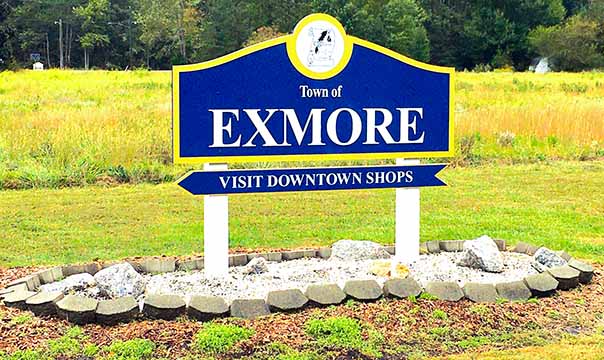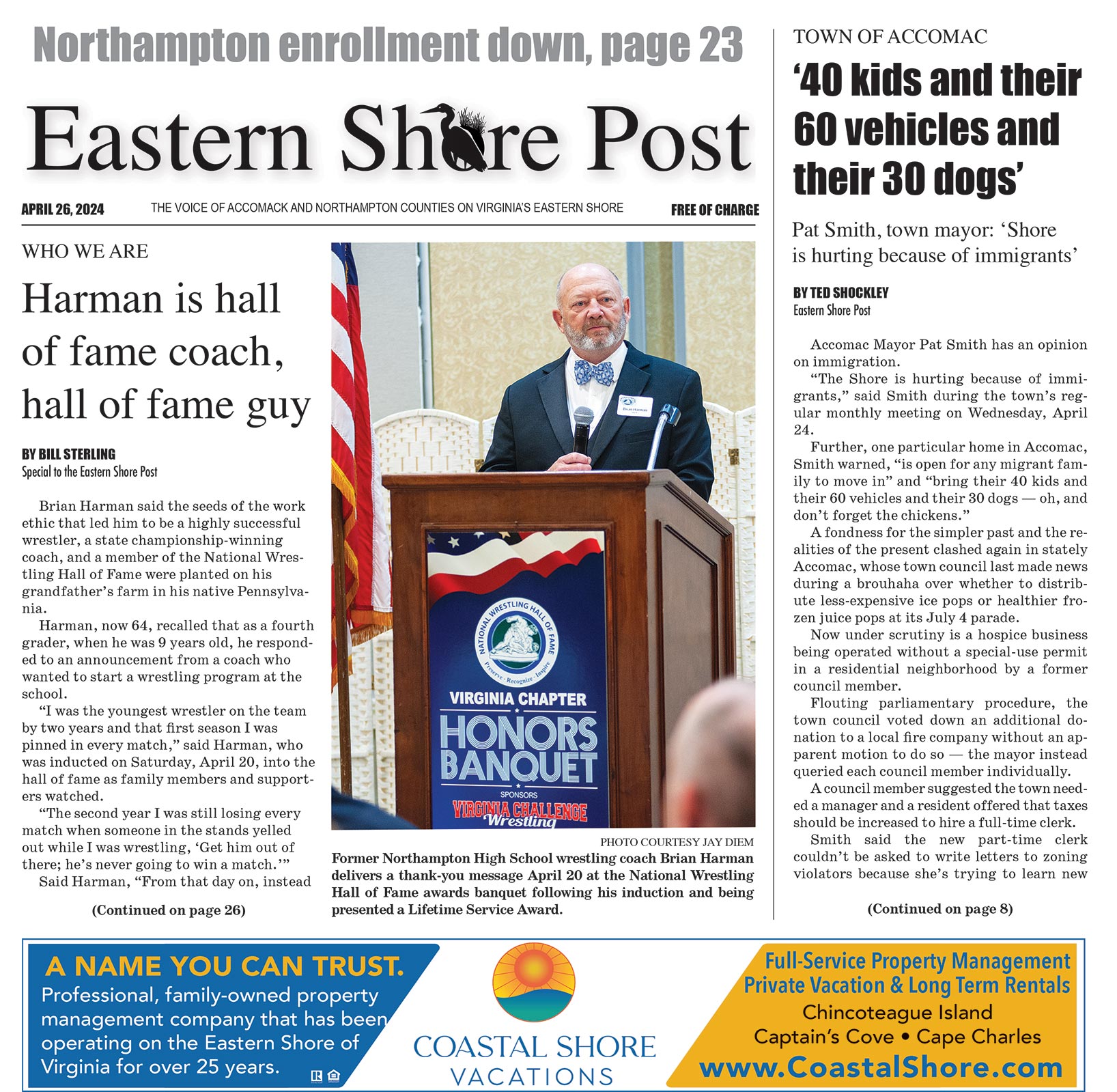By Stefanie Jackson – Emotions ran high at Exmore’s town hall Monday night when Town Manager Robert Duer broke the news to citizens that Exmore had been disqualified for a $6 million loan from the Virginia Department of Environmental Quality (VDEQ), which the town needed to fix its sewer system.
He was blindsided with the news during an Oct. 30 conference call that left him “perplexed and bewildered.”
The events leading up to the fateful phone call began in July when Taylor Dukes, Exmore’s director of public utilities, and Sheryl Stephens, a representative of Exmore’s engineering firm, Draper Aden Associates, went to Richmond to meet with VDEQ representatives and discuss Exmore’s sewer needs.
The pair believed VDEQ’s overall message was, “We’re going to help you.” An Oct. 2 letter from VDEQ stating Exmore’s project was “tentatively approved” appeared to confirm that belief.
Exmore was third on VDEQ’s list of funding priorities for sewer projects. It scored nearly 379 points, with two other applicants scoring about 399 points each.
VDEQ representatives visited Exmore on Oct. 10 for another meeting, during which town officials explained their intentions: to upgrade the town’s sewage collection system and enable up to 900 customers to get service.
Exmore’s existing sewage treatment plant would be decommissioned. It can serve only about 350 current customers, due to a Virginia Department of Health consent order.
Future wastewater treatment would be performed at a plant built and maintained by a private company, Aqua, or a public entity, Hampton Roads Sanitation District (HRSD).
HRSD has proposed building a sewer main from Nassawadox to Exmore, Melfa, and part of Accomac, and connecting those towns to Onancock’s wastewater treatment plant, which has excess capacity.
The towns would be responsible to build any desired upgrades to their collection systems that would carry wastewater to the force main.
HRSD would accept all future responsibility for sewer maintenance and billing.
It could be a boon to town employees but a bane to low-income residents.
Exmore’s town council and officials are worried about HRSD’s proposed rate increases, which may be unaffordable within 10 years, when the average customer could receive a monthly sewer bill of $150 or more.
Duer and Dukes have been researching alternatives such as the private company, Aqua, which would lock in sewer rates for 10 years.
Aqua representatives arrived in Exmore for a meeting with town officials Oct. 28.
Two days later, VDEQ representatives made a phone call to town officials and informed them that Exmore was not eligible for funding because of the consent order preventing new sewer connections.
VDEQ had been aware of the consent order for six months.
That night, Duer held a “911 meeting” on the loss of the $6 million loan. Around 3 a.m., the sleepless town manager sent Del. Rob Bloxom a text message about his worries for Exmore.
The message suggested a backdoor deal had been made to “take the money we had planned for Exmore and give it to Onancock.”
Onancock is still in debt about $4.5 million for its wastewater treatment plant.
If that debt was paid off, “miraculously, HRSD becomes viable and poor little Exmore gets the shaft,” Duer’s message continued.
Without Exmore’s participation in HRSD, Accomack and Northampton County could wind up with a sewer pipe extending from Eastern Shore Community College, in Melfa, to Nassawadox “for three customers,” and it could cost $10 million, Duer said.
“I’m mad at Northampton County,” because it could pay about $1.5 million to run a sewer line from Nassawadox to Exmore, “but we’d rather waste $9 million,” Duer said.
“This is akin to a jail we built for 200 prisoners, that holds 90 but we staff for 200 … a $30 million industrial park that has one business … a railroad that we sunk God knows how much money in, that went belly up … the $10 million road in Cape Charles,” he said.
Duer sent an email to VDEQ representatives Oct. 31 and asked if HRSD also would be disqualified from receiving VDEQ funds if it took over Exmore’s wastewater treatment plant and the accompanying consent order.
Duer did not receive a reply.
HRSD’s proposed plan for the Eastern Shore is fifth on VDEQ’s list of sewer project funding priorities.
With Duer’s permission, Stephens called Karen Doran at VDEQ to convince her to leave Exmore on its funding list.
Doran demanded a preliminary engineering report (PER) and a comparison of Exmore’s options for its sewer system, including building its own treatment plant or partnering with Aqua or HRSD.
Doran repeatedly mentioned the consent order.
“I don’t think I could make her understand that you know you cannot make new connections to the existing plant, and that you have no intention of doing that,” Stephens told Duer in an email.
Doran suggested re-applying for VDEQ funding in summer 2020 with a PER and a contract with Aqua or another company in place.
But the town needs the money to pay for the PER.
Doran assured Stephens that VDEQ would loan Exmore the money at 0% interest.
Duer sent VDEQ a memo requesting $300,000.
Stephens advised re-applying for the construction funds next summer, even though it could delay the project up to a year.
“You would think the Department of Environmental Quality’s main goal would be … to clean up the environment … but it’s not,” Duer asserted.
He had an “ace in the hole” that proved VDEQ knew about the consent order when it tentatively approved the Exmore sewer project in October.
VDEQ’s list of funding applicants, generated before Oct. 2, included a note under Exmore’s listing: “VDH consent order dated 10 June 2008.”
“Do you understand why I’m hot?” Duer asked the council.
Councilman Thomas Lewis echoed Duer’s sentiments. It’s “crooked politics,” he said.
“I sit up on this council for the people of this town, not to be a politician,” and Aqua’s proposal was the best for the town, Lewis said.
“HRSD has $2.9 billion that everybody that ties on to that line is going to pay for,” he continued.
“But what happens to our homes’ values when you’ve got a sewer bill that’s $160, and you’re trying to buy a house here in town? You ain’t gonna sell it. You’d just as well give it away.”
The people who support HRSD can afford that kind of sewer bill, Lewis said. “But what can the rest of these people do?”
“That’s what’s wrong with this whole country. … Nobody can come together. … When you go to them with a problem, and you need help and you do everything you can possibly do, they turn your back on you.”
Mayor Douglas Greer asked if there was another way to borrow the $6 million for the Aqua project.
Dukes said any other borrowing method would lack the 0% interest, and “then we’re going to be back up to a $150 bill.”
Duer said he’s “disgusted” with “dirty politics.”
Exmore officials do not know how or when the town will get the money for its sewer project.
The council declined to act Monday night on a resolution stating Exmore will petition Northampton County circuit court to become part of the Hampton Roads Sanitation District.
Duer likened Exmore’s struggle to the story of David and Goliath, in which Gov. Ralph Northam is King Saul, VDEQ is the Philistines, HRSD is Goliath, and Exmore is David.
“We’re going to have to take a shot at somebody here sooner or later, but I think right now, we’re losing the battle.”



